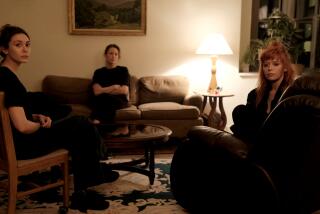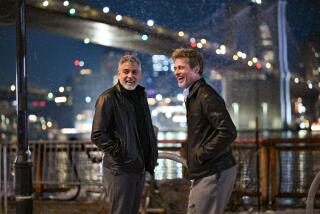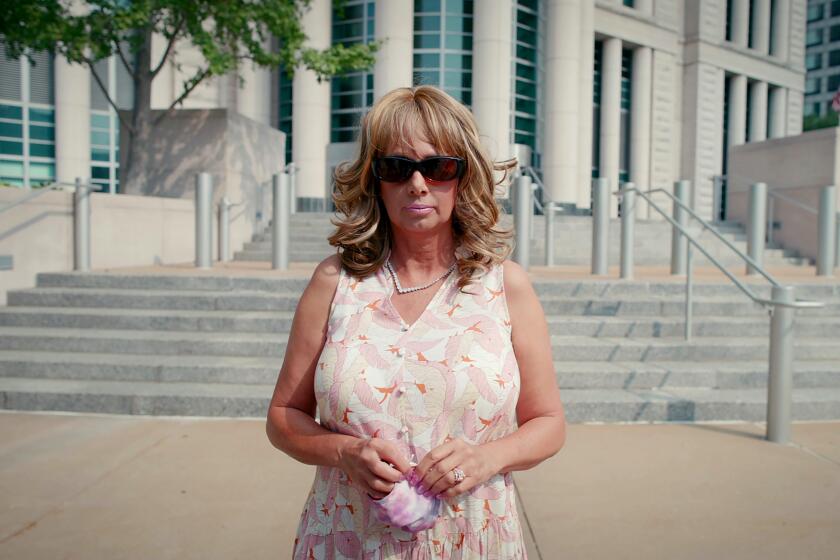Movie review: ‘The Descendants’
There is a telling moment within the intimate family drama of “The Descendants” that has George Clooney running as if his life depended on it. As Matt King, he’s an awkward sight pounding through his quiet neighborhood in flip-flops, Hawaiian shirt and shorts; laughable if that famous face were not so twisted by helplessness and hurt. You’re not sure whether he is running from something or to something, or both.
Just one scene, but powerfully reflective of the theme director Alexander Payne has coursing through this winning and warm-hearted film — that the hard truths of life are as impossible to escape as they are difficult to embrace. It makes “The Descendants” a tragedy infused with comedy and calls for a balancing act from filmmaker and star alike, a tightrope they navigate with nary a wobble.
Based on Kaui Hart Hemmings’ rich novel, the King family in “The Descendants” is deeply rooted in Hawaiian history. The film unfolds across the islands, with veteran cinematographer Phedon Papamichael reuniting with Payne for the first time since their “Sideways” collaboration seven years ago to give us a glimpse of what it’s like to live in, not just visit, a tropical paradise. Yes, there are the unsullied outbacks, ukulele bars, crazy locals, coral reefs, endless beaches and laid-back vibe that you’d expect. But also rush-hour traffic jams, late nights at the office, suburban subdivisions with their cookie-cutter houses, parent-teacher conferences and the rest of what constitutes everyday life. As Matt tells us in one of the confessional voice-overs woven through the film, paradise comes with its share of pain and problems.
When we meet Matt, it is in the midst of crises. His wife’s recent boating accident has put her in a coma and him, at least temporarily, in charge of the kids. Handling a precocious and prickly 10-year-old, Scottie (Amara Miller), and the outright rebellion of 17-year-old Alexandra (Shailene Woodley) is no easy matter even in the best of times. And for the King family, this is pretty much the worst of times.
As Payne has a habit of doing, he starts with a whole raft of issues then keeps his main players in an almost continuous state of conflict. It is part of what makes Hemmings’ novel, riddled with tough choices yet humanistic in its tone, such a natural for the filmmaker. Told from the point of view of Matt in middle-age, he is a man being forced by circumstance to become the father he was meant to be, the husband he’d forgotten he was. Adapted quite faithfully by the director and Groundlings vets Nat Faxon and Jim Rash, the film is conversational in its pathos, wry in its wisdom, very much an extension of the smart, sardonic sensibility Payne brought to “Sideways,” and “About Schmidt.” (The filmmaker shared the screenwriting Oscar with Jim Taylor for “Sideways.”)
By keeping the hysterics at bay, this messy family actually works. Miller, 9 when the film was shooting, pulls off a mix of anger and innocence as Scottie swings between preserving the past and upending the present. Woodley is beautifully nuanced as Alexandra, still nursing old wounds and pushing buttons and boundaries with a kind of insolence that anyone who’s ever had a teenager will recognize. Meanwhile, dad has conveniently become the main object of their rejection, abuse that is delivered by very salty young tongues — similar to Payne’s “Election,” the sudden bursts of vulgarity may take you aback.
But the filmmaker is concerned with more than just Matt’s immediate family or his immediate problems. It delves into the notion of legacies — the good and bad that we inherit, the love and hate we leave behind. It also deals with the raw emotions that life-threatening moments stir up, a very rare bit of honest refection for an American movie.
In addition to the kids, Matt’s legacy includes a pristine swath of Kauai beachfront, what remains of land handed down to the sprawling King clan, descendants of the long-ago union of a Hawaiian princess and the banker son of white missionaries. It is about to be sold off and for that, and other even dicier reasons, Kauai soon looms large as the place that holds all the answers.
Aiding and undermining Matt at every turn is an eclectic collection of friends, family and strangers, each with their own set of emotional baggage. Especially good is Alexandra’s sweet-stoner friend Sid (Nick Krause), Matt’s irascible father-in-law Scott (Robert Forster), and both Julie and Brian Speer, a couple whose lives cross Matt’s in profound ways (Judy Greer and Matthew Lillard respectively).
The ensemble of actors reflects Payne’s penchant for unconventional casting, many playing against type, like Lillard trading “Scooby-Doo” silliness for drama. Even the smallest roles feel authentic. That attention to detail can be found throughout the film — the pile of shoes left on the porches to keep sand out of houses; the ICU with its floor-to-ceiling glass walls the better to see crises in a glance; the traditional Hawaiian music, much of it from the late slack-key guitar legend Gabby Pahinui.
But this is Clooney’s show and he is hands-down terrific as a harried father and wary husband trying to make up for lost time. All the slick patter of “Ocean’s Eleven” has been set aside, all the diffidence dropped, no traces of Clooney the player remain. Instead the actor has opened up his heart, allowing waves of resentment and regret to batter him, loyalty and love to test him. Who would have thought that one of the last true Hollywood stars would find himself in this ordinary man who deals in very ordinary ways with life in all of its wonderful, wounded whimsy.
More to Read
The biggest entertainment stories
Get our big stories about Hollywood, film, television, music, arts, culture and more right in your inbox as soon as they publish.
You may occasionally receive promotional content from the Los Angeles Times.











